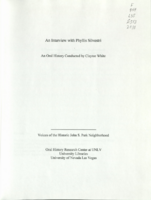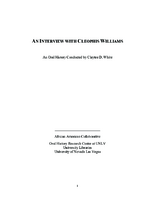Search the Special Collections and Archives Portal
Search Results

Transcript of interview with Hazel Hedges by Irene Rostine, October 29, 1997
Date
Archival Collection
Description
Interviewed by Irene Rostine. Hazel Hedges moved from Kansas City to Las Vegas with her husband and son in 1952. She worked briefly as a waitress in the dining room at the Thunderbird and then became a stay at home mom until her son was in junior high. Then after she went to real estate school, she went to work in commercial real estate at Bond Realty. After that, she passed her brokers exam and transferred to Parkway Realty where she sold land. Her primary success in real estate came from selling houses and investing in land and residential properties personally. After leaving Parkway Realty, Hazel went to work for the real estate office Deshoor, Fair, and Davis, which she eventually bought and renamed Southside Realty. Eventually her son joined her, and they operated Hedges and Wade Realty with two offices, one on each side of town. Hazel also did volunteer work including the Assistance League Las Vegas' Operation School Bell Program, which provides clothing for area school children in need.
Text

Transcript of interview with Daisy Lee Miller by Claytee White, March 22, 2013
Date
Archival Collection
Description
Daisy Lee Miller talks about being born and raised as an only child in Louisiana before moving to Las Vegas in her 20s. For a time, Daisy worked in the powder room at the California Club. It was while she was employed here that she realized she wanted something better, and she wanted to be a good example tor her kids. Daisy began attending the University of Nevada, Las Vegas to get her degree. Daisy is very proud of the fact that she graduated from UNLV at the same time that her daughter graduated from high school. Family has always been very important to Daisy, and she enjoyed spending time with her children while they were growing up. Sundays always found Daisy and her children at church while other leisure-time activities included trips to the lake or Mt. Charleston. While going to school, Daisy worked at the Economic Opportunity Board in the family planning program. Following graduation, Daisy began working for the Clark County School District where she rapidly advanced
Text

Transcript of interview with Phyllis Silvestri by Claytee White, January 11, 2010
Date
Archival Collection
Description
As a young woman, Phyllis Silvestri made the adventurous decision to move to the United States. She was bom in Canada and lived there until her early 20s. Over the next few years, Phyllis and her friend Mona logged many miles, worked and visited several states. By 1953, Phyllis had met and married Vincent Silvestri, who worked at Bingo Palace, now the Sahara Hotel and Casino. Soon they had their first child and had bought a home on Santa Rosa. A few years later they were building a new home in the John S. Park area. She proudly recalls her husband's attention to details such as including lots of built-in features and a bomb shelter that represents the era. Phyllis talks fondly of the neighborhood, but also recalls her children not being allowed to play with some of the neighborhood children because they were of Italian ancestry.
Text

Jean Sherman McColl interview, March 1, 1977: transcript
Date
Description
On March 1, 1977, collector Sam C. Melchiome Jr. interviewed Jean McColl (born May 24th, 1931 in California) at her home in Las Vegas, Nevada. In this interview, Jean McColl discusses growing up in Searchlight and then Las Vegas, Nevada. She discusses how her family came here as well as the many changes she has seen through the decades living in Las Vegas, Nevada.
Text

Transcript of interview with Evelyn Miller McDonald by Maylene C. Cabatingan, February 26 & 27, 1980
Date
Archival Collection
Description
On February 26, and 27, 1980, Maylene C. Cabatingan interviewed Evelyn Miller McDonald (born 1905 in Alderson, West Virginia) about her life in Las Vegas, Nevada. Also present during the interview is Maylene’s step-father (name unknown) who occasionally participates in the conversation. At the time of the interview, McDonald had lived in Nevada for over seventy-two years and described early Las Vegas as a small-town railroad community with few amenities. McDonald discusses her occupational history, and how her father started the first car garage in Las Vegas. She goes on to talk about the impact of the Great Depression on Las Vegas and how Hoover Dam’s construction reduced the severity of the financial depression in comparison to other cities. She then recites the hotels that were built and the appeal that Vegas had to tourists and divorcees. McDonald later discusses how prostitution was accepted by the community, and recalls a story about how local businessmen rallied together to ensure that a minister would preach the funeral for a young woman who had died, despite being a prostitute. McDonald concludes her interview with a brief discussion of her goals in life and her pride in her daughters.
Text

Mary Carol Melton interview, March 5, 1981: transcript
Date
Archival Collection
Description
On March 5, 1981, collector Kathy Ricks interviewed Mary Carol Melton (b. April 4th, 1900 in Rockville, Missouri) about her life in Nevada and the development of the United Methodist Church in Las Vegas. Melton speaks about moving to Las Vegas, Nevada because of her husband’s health, her time working with attorney offices and in the Las Vegas Courthouse, and the different homes in which her family lived. Moreover, Melton talks extensively about starting the first Sunday school in North Las Vegas in a garage as well as the church she and her husband built. Melton discusses the programs and minstrels performed in the church, the crafts sold to make money for the church and the organ they purchased. Lastly, Melton talks about going to the Hoover Dam nearly every week to see new developments, her participation in the Daughters of the American Revolution (DAR), and watching the above ground atomic tests.
Text

Transcript of interview with Cleophis Williams by Claytee White, April 27, 2010
Date
Archival Collection
Description
In 1943, Cleophis Hill Williams was a teenager visiting her mother who had moved to Las Vegas. For most of her young life she had lived with her parents in Muskogee, Oklahoma and Paul Spur/Douglas, Arizona. The same year that she visited Las Vegas, she met her future husband Tom Williams, with whom she had nine children, all born and raised on the Westside. Tom worked construction and built their first home on G Street. For Cleophis, she focused her life on raising her children and, whenever possible, finding some precious time to read.
Text

Transcript of interview with Dale Duane Everett by John Everett, March 7, 1980
Date
Archival Collection
Description
On March 7, 1980, John Everett interviewed his father, cab driver Dale Everett (born January 29, 1924 in Danville, Illinois) at their family home in Las Vegas, Nevada. This interview covers past local historical data. During the interview, Mr. Everett discusses the weather, wildlife, and hunting. He also shares his views on prostitution and gambling in Las Vegas.
Text

Transcript of interview with Bertha Gresh by James M. Green, November 1, 1974
Date
Archival Collection
Description
On November 1, 1974, collector James M. Greene, interviewed widow and mine leaser, Bertha Gresh (born August 29th, 1883, in Cedarburg, Wisconsin) in her home in Nelson, Nevada. This interview covers early mining days, Bertha’s personal history, and the history of Nelson County. She also discusses her art, social activities, and the prizes she won as a visual artist in Nevada.
Text

Transcript of interview with Sally Halko by Roberta Farmer, March 11, 1978
Date
Archival Collection
Description
On March 11, 1978, Roberta Farmer interviewed Sally Halko (born 1921 in Gowen, Oklahoma) about her life in Las Vegas, Nevada. Halko first talks about her family background, education, traveling, and church membership. She later talks about the development Las Vegas casinos, racial minorities, housing growth, Lake Mead, and the first theaters.
Text
